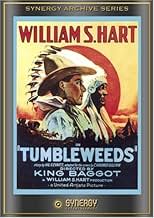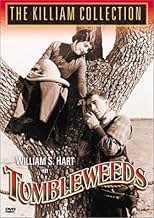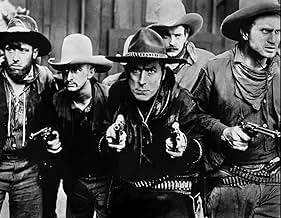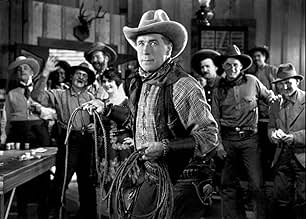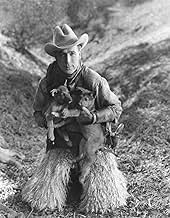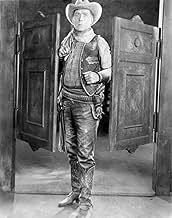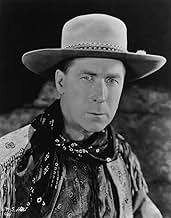CALIFICACIÓN DE IMDb
6.5/10
692
TU CALIFICACIÓN
El gobierno concederá una franja de terreno a los colonos que quieran vivir y trabajar allí. La señal de partida será un disparo que iniciará la carrera hacia los mejores campos y concesione... Leer todoEl gobierno concederá una franja de terreno a los colonos que quieran vivir y trabajar allí. La señal de partida será un disparo que iniciará la carrera hacia los mejores campos y concesiones.El gobierno concederá una franja de terreno a los colonos que quieran vivir y trabajar allí. La señal de partida será un disparo que iniciará la carrera hacia los mejores campos y concesiones.
William S. Hart
- Don Carver
- (as Wm. S. Hart)
Richard Neill
- Bill Freel
- (as Richard R. Niell)
George F. Marion
- Old Man
- (as George Marion)
Taylor N. Duncan
- Cavalry Major
- (as Ted Duncan)
Nora Cecil
- Pioneer Mother
- (sin créditos)
Nino Cochise
- Indian
- (sin créditos)
Monte Collins
- Hicks
- (sin créditos)
Fred Gamble
- Hotel Proprietor
- (sin créditos)
George Marion
- Homesteader
- (sin créditos)
Apache Bill Russell
- Indian
- (sin créditos)
- Dirección
- Guionistas
- Todo el elenco y el equipo
- Producción, taquilla y más en IMDbPro
Argumento
¿Sabías que…?
- TriviaThis film was first telecast on New York City's pioneer television station WNBT Thursday 17 July 1941. It is one of over 200 titles in the list of independent feature films made available for television presentation by Advance Television Pictures announced in Motion Picture Herald 4 April 1942. At this time, television broadcasting was in its infancy, almost totally curtailed by the advent of World War II, and would not continue to develop until 1945-1946.
- Citas
Don Carver: Boys, it's the last of the West.
- Versiones alternativasThe 1939-reissued version was preceded by an eight-minute sound prologue with William S. Hart introducing the film.
- ConexionesFeatured in The Great Chase (1962)
Opinión destacada
For many years prior to 1889, the US government leased the lands of the Indian Territory to cattleman for grazing their cattle herds. Ranches were built. Now the ranchers had to leave by April 1889 as 1200 square miles of the Oklahoma territory were being opened to new homesteaders. (There would be other Oklahoma land runs throughout the 1890s.)
Hart's character, Don Carver, is the typical quiet and intense cowboy known as a "tumbleweed," a drifting cowhand. Carver and his comedic sidekick Kentucky Rose (Lucien Littlefield) ride into the town of Caldwell, Kansas, population 200. This is the calm before the storm as homesteaders begin to pour into town for the big land run. Carver, and later Kentucky, decides to register for the rush, to acquire a piece of free land. The US Cavalry, in charge, has posted warnings that those who jump the starting line before the appointed time will be arrested as "sooners" and kept in a pen until after the land rush.
Seedy Bill Freel, a/k/a Burton (Richard Niell), craves Joe Hinman's Box K Ranch on the Strip (abandoned by decree) as it controls the waterways of the area. He has a devious plan to sneak across the starting line before the assigned date and time. His new partner is nefarious Noll Lassiter (J. Gordon Russell), half-brother of Molly Lassiter (Barbara Bedford). Freel has a yearning for Molly, who loathes him. She has instead developed a relationship with Carver, nearly forty years her senior in real life. Like Freel, Carver also has his eyes on the Box K property (where he formerly worked), including the ranch house.
When Don rides back into the Strip to look for and round up some straying cattle, he is arrested by US Cavalry Major White (Taylor Duncan) at the instigation of Freel and Noll Lassiter. These sordid characters have falsely accused him of being a "sooner." Now by law Carver is kept in the bull pen until after the land run. How Carver escapes is quite innovative, and he happens to have the fastest steed nearby. If only he can make up the lost ground and stake the Box K Ranch grounds.
When William S. Hart reissued this 1925 silent film (his last and perhaps greatest) in 1939, he preceded it with his famous eight- minute "Farewell to the Screen" introduction. Knowing the real West, Hart had arrived in Hollywood in 1914 at the mature age of 49 and acted for eleven years. He and Tom Mix were the greatest cowboys of the silent screen. Hart's partner here, Lucien Littlefield, specialized in playing older roles. In "Tumbleweeds" he looks about sixty even though he is only thirty. Although not as good as "The Iron Horse" (1924), the greatest silent western of them all, "Tumbleweeds" is still worth a look, especially because of the rousing land rush scene, an epic shot from the days of silent cinema.
Hart's character, Don Carver, is the typical quiet and intense cowboy known as a "tumbleweed," a drifting cowhand. Carver and his comedic sidekick Kentucky Rose (Lucien Littlefield) ride into the town of Caldwell, Kansas, population 200. This is the calm before the storm as homesteaders begin to pour into town for the big land run. Carver, and later Kentucky, decides to register for the rush, to acquire a piece of free land. The US Cavalry, in charge, has posted warnings that those who jump the starting line before the appointed time will be arrested as "sooners" and kept in a pen until after the land rush.
Seedy Bill Freel, a/k/a Burton (Richard Niell), craves Joe Hinman's Box K Ranch on the Strip (abandoned by decree) as it controls the waterways of the area. He has a devious plan to sneak across the starting line before the assigned date and time. His new partner is nefarious Noll Lassiter (J. Gordon Russell), half-brother of Molly Lassiter (Barbara Bedford). Freel has a yearning for Molly, who loathes him. She has instead developed a relationship with Carver, nearly forty years her senior in real life. Like Freel, Carver also has his eyes on the Box K property (where he formerly worked), including the ranch house.
When Don rides back into the Strip to look for and round up some straying cattle, he is arrested by US Cavalry Major White (Taylor Duncan) at the instigation of Freel and Noll Lassiter. These sordid characters have falsely accused him of being a "sooner." Now by law Carver is kept in the bull pen until after the land run. How Carver escapes is quite innovative, and he happens to have the fastest steed nearby. If only he can make up the lost ground and stake the Box K Ranch grounds.
When William S. Hart reissued this 1925 silent film (his last and perhaps greatest) in 1939, he preceded it with his famous eight- minute "Farewell to the Screen" introduction. Knowing the real West, Hart had arrived in Hollywood in 1914 at the mature age of 49 and acted for eleven years. He and Tom Mix were the greatest cowboys of the silent screen. Hart's partner here, Lucien Littlefield, specialized in playing older roles. In "Tumbleweeds" he looks about sixty even though he is only thirty. Although not as good as "The Iron Horse" (1924), the greatest silent western of them all, "Tumbleweeds" is still worth a look, especially because of the rousing land rush scene, an epic shot from the days of silent cinema.
- romanorum1
- 17 jul 2016
- Enlace permanente
Selecciones populares
Inicia sesión para calificar y agrega a la lista de videos para obtener recomendaciones personalizadas
Detalles
Taquilla
- Presupuesto
- USD 312,000 (estimado)
- Tiempo de ejecución1 hora 18 minutos
- Mezcla de sonido
- Relación de aspecto
- 1.33 : 1
Contribuir a esta página
Sugiere una edición o agrega el contenido que falta

Principales brechas de datos
By what name was Plantas rodantes (1925) officially released in Canada in English?
Responda
